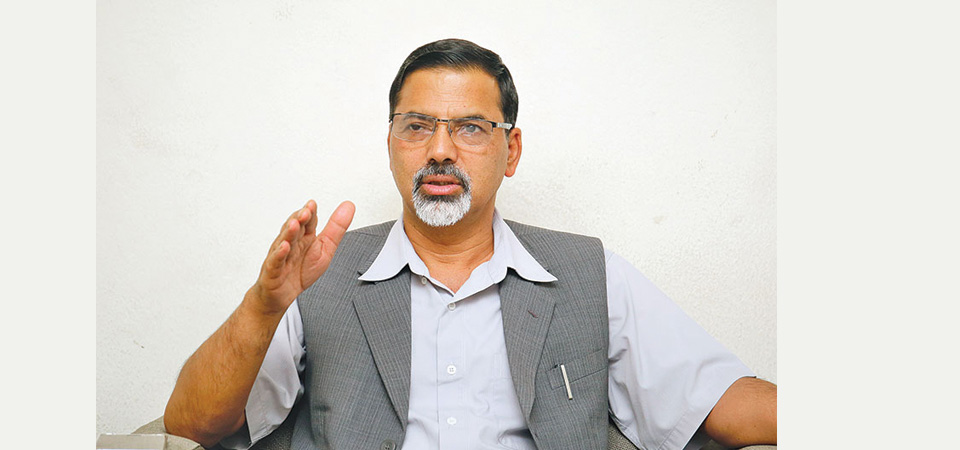Commission-seeking tendency affects FDI inflow: FM Sharma

By A Staff Reporter
Kathmandu, Sept. 22: Minister for Finance Janardan Sharma ‘Pravakar’ has said that Nepal has failed in attracting the much needed Foreign Direct Investment (FDI) because of the commission-seeking tendency.
“Instead of attracting investors with facilitation in every step and offering fast-track services, we turn our faces to other direction, involve in brokerage of the projects for our own benefits and seek commission in every project,” he said while addressing seminar on ‘Capital expenditure and FDI in Nepal’ organised by the Central Department of Economics (CEDECON) of the Tribhuvan University on Tuesday.
He stated that the leaders, bureaucrats and business community people must shed off individual interests while there is a chance of serving the nation and fulfilling the national interest.
“We have become self-centred and selfish and given more priority to our individual interests which pushed the national interest to the back,” said FM Sharma.
According to him, lack of proper coordination among the government ministries and projects is negatively impacting the implementation of infrastructure and development project and mobilisation of capital budget.
Ministry of Finance feels shy in transferring the rights to the line ministries while the latters don’t give enough rights to the project chiefs instead want to control him from the centre which has resulted in delayed progress in development work.
Assuring the investors better service, facilitation and environment, FM Sharma said that the country was in a dire need of expanding industrial set ups and business activities to utilise about 400 Megawatt electricity that is being wasted since the beginning of the rainy season this year.
“Capital budget mobilisation is very poor. If we can’t improve it, it will adversely impact capital formation and overall development of the country,” he said. “We don’t have an integrated development strategy. Priority of development and planning is changed every time a ministry gets a new leadership,” he said.
The Finance Minister also blamed the low bidding for the poor progress of the development projects. “We must change the system to award the contract to the contractors who bid a project at 40-60 per cent of the total estimated cost,” he maintained.
He said that the government would adopt a policy to spend 10 per cent of the capital budget every month.
Former Vice Chairman of the National Planning Commission (NPC) Prof. Dr. Puspa Raj Kadel said that the reform for capital expenditure should begin from the Prime Minister and ministers. According to him, most of the leaders’ concern after assuming the high post is to provide some projects to their henchmen.
He said that there was a critical situation in the country as the resources for development are mobilised to the sub-national governments while the projects are coming back to the federal government.
Associate Professor at the CEDECON, Dr. Ramesh C. Paudel said increasing trend of current expenditure and decreasing trend of capital expenditure has become a serious issue in Nepal for more than two decades now.
According to a paper he presented at the seminar, capital expenditure in Nepal has dropped to 19 per cent of the total expenditure in 2017/18 from 68 per cent in 1990/91.
He recommended making regular expenditures with strong monthly or fortnightly evaluation system. “One structured body like NPC can be established to implement the programmes and policy more effectively,” he said.
Recent News

Do not make expressions casting dout on election: EC
14 Apr, 2022
CM Bhatta says may New Year 2079 BS inspire positive thinking
14 Apr, 2022
Three new cases, 44 recoveries in 24 hours
14 Apr, 2022
689 climbers of 84 teams so far acquire permits for climbing various peaks this spring season
14 Apr, 2022
How the rising cost of living crisis is impacting Nepal
14 Apr, 2022
US military confirms an interstellar meteor collided with Earth
14 Apr, 2022
Valneva Covid vaccine approved for use in UK
14 Apr, 2022
Chair Prachanda highlights need of unity among Maoist, Communist forces
14 Apr, 2022
Ranbir Kapoor and Alia Bhatt: Bollywood toasts star couple on wedding
14 Apr, 2022
President Bhandari confers decorations (Photo Feature)
14 Apr, 2022










